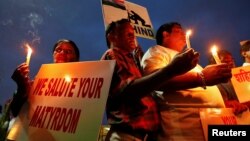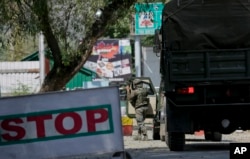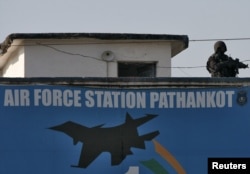Indian Prime Minister Narendra Modi met with senior ministers and defense officials on Monday to craft his country's response to a militant strike on an Indian army base in Kashmir that killed 18 soldiers.
Many in the country, including some politicians, demand a hard-hitting reaction. Senior officials in New Delhi have blamed the assault, one of the deadliest on an Indian army base in Kashmir, on Pakistan-based militants.
Four heavily armed gunmen lobbed grenades and opened fire on an army camp close to the border with Pakistan early Sunday.
The attack has triggered some tough rhetoric in India. Lieutenant General Balbir Singh said on Monday “we have the capacity to react to such blatant acts of aggression and violence.”
He told reporters “we reserve the right to response to any act of the adversary at the time and place of our own choosing.”
Home Minister Rajnath Singh has called Pakistan a terrorist state and said it “should be identified and isolated as such.”
Pakistan's government strongly rejected the accusations and expressed concern at what it called the “vitriolic and unsubstantiated statements from India’s civil and military leadership.”
That did not placate New Delhi. Dismissing Islamabad’s denial of involvement, Junior Defense Minister, Subhash Bhamre said India would give a fitting response. “We know Pakistan is behind this,” he said.
The army has said Sunday's assault bore the trademark of Pakistan-based militant group Jaish-e-Mohammed. It said weapons and other equipment at the site had Pakistani markings.
No group has claimed responsibility for the strike.
Nine months ago, India accused the group of mounting a terror strike on an air base in Pathankot.
However, many other Indian officials have cautioned against any knee-jerk reaction.
Junior foreign minister, V.K. Singh, who is a former army chief, said India’s response must not be emotional but logical.
“To do anything, we must think with a cool mind, consider it properly and work according to a strategy,” he said.
Many agree that India’s response must be measured.
Defense analyst Rahul Bedi in New Delhi said that Modi is under pressure to do “something demonstrable” because his Hindu nationalist Bharatiya Janta Party has always advocated a tough stand against Pakistan. But Bedi pointed out that “military options are not only restricted, I think they are virtually non-existent.”
India says it will launch a diplomatic offensive against Islamabad and step up pressure to isolate Pakistan at international gatherings.
Likely scenarios
As a first step, New Delhi is likely to raise the issue at the United Nations General Assembly in New York, where Kashmir is likely to come up on the agenda.
Pakistan has also called for a U.N. investigation into alleged human rights abuses by Indian security forces in Kashmir, which has been wracked with street protests that have killed nearly 80 people in the past two months.
Anti-India sentiment has flared in Kashmir since the security forces killed a local militant leader in July.
Kashmir, which is divided between India and Pakistan, is one of the world’s most heavily militarized regions. In the aftermath of Sunday’s attack, the Indian army has beefed up security along the line of control that divides the region.






